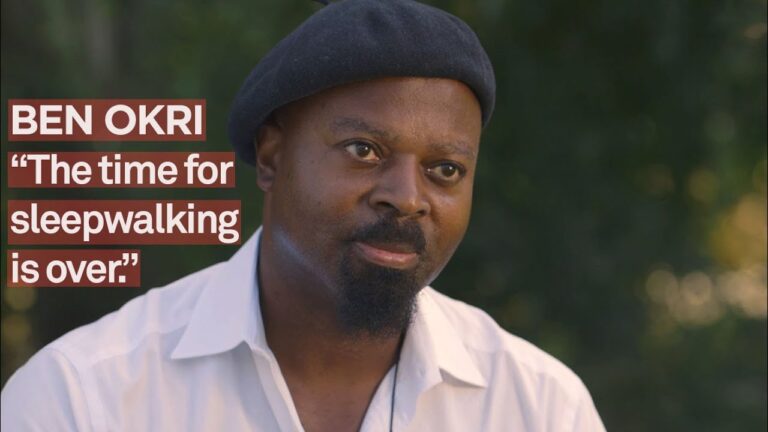
“The time for sleepwalking is over.” Experience the Booker Prize-winning writer Ben Okri in this in-depth video, where he talks passionately about what it means to live between worlds, and why a new way of thinking is needed worldwide: “A huge awakening has to take place fast.”
The essence of our world is transitioning, Okri feels, moving from one thing to something “possibly quite dangerous for humanity, for most people on this planet.” In this, literature can help: “It’s adjusting your mental lens, so that you see the world in a new way, clearly for the first time.” Literature and language, he finds, are intimately related to consciousness, rendering them extremely important with the ability to “shift the axis of an age.” Okri finds that we are “harbourers of prisons,” and that we need to free ourselves of those prisons and realise our potential as human begins and citizens in a society to the fullest, and recognise that we are co-creators of the world: “Literature at its best empowers that.”
Coming back from England to Africa as a child was an extraordinary awakening for Okri: “Because it made me aware in reverse that no culture has an absolute view on looking at the world.” But above all, Okri experienced death during the Nigerian civil war at an early age: “To see death at eight is a real awakener, because you’re aware, from very early on, of the strange apparent finality of life.” Moreover, Okri realised the gap between the world rendered in, e.g. a Charles Dicken novel and the African reality, and he found it impossible to go on without finding a new way to write that would capture all the different levels of reality with which he had grown up. In connection to this, he finds that living between worlds, in a “third space,” is invaluable: “We can ascend mountaintops in all kinds of ways. But there’s an extraordinary synthesis that happens when you have two cultures, two realms, two worlds.” Furthermore, Okri comments that to insist on one belief system as being the only way of seeing the universe “is not only narrow, it’s a kind of mental, cultural and spiritual tyranny, which has incredible implications for storytelling and for our relationships with one another – and for our relationship with nature.” This, he explains, means that we are continuously waiting for the evidence of the destruction we have caused before we believe that we have caused any destruction – and by then it’s too late.
Ben Okri (b.1959) is a Nigerian novelist, poet, essayist, short story writer and playwright. Okri is the author of several novels including ‘The Famished Road’ (1991) (for which he won the 1991 Booker Prize as the youngest writer ever), ‘Songs of Enchantment’ (1993), ‘Dangerous Love’ (1996), ‘Infinite Riches’ (1998), ‘Starbook’ (2007), and ‘The Freedom Artist’ (2019). Among numerous prestigious literary awards, Okri is the recipient of the Paris Review/Aga Khan Prize for Fiction (1987), the Booker Prize for Fiction (1991), Premio Palmi (1995), and an OBE (Order of the British Empire) in 2001. He lives in London. For more see: https://benokri.co.uk/
Ben Okri was interviewed by Marc-Christoph Wagner in connection with the Louisiana Literature festival at the Louisiana Museum of Modern Art, Denmark in August 2019.
Camera: Rasmus Quistgaard
Edited by: Klaus Elmer
Produced by: Marc-Christoph Wagner
Copyright: Louisiana Channel, Louisiana Museum of Modern Art, 2019
Supported by Nordea-fonden
FOLLOW US HERE!
Website: http://channel.louisiana.dk
Facebook: https://www.facebook.com/LouisianaChannel
Instagram: http://www.instagram.com/louisianachannel
Twitter: http://www.twitter.com/LouisianaChann
source